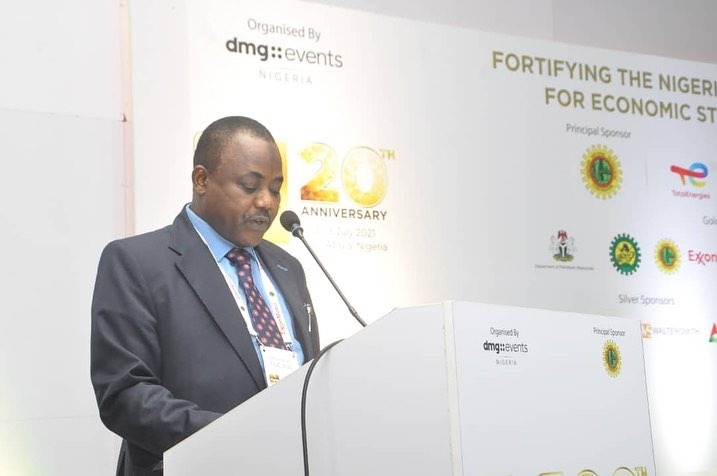By Ndubuisi Micheal Obineme
Abuja – The Department of Petroleum Resources (DPR) has said that for a sustainable national economic stability and growth, there is a need to strengthen legal, institutional, financial, in-sector diversification, and indigenous capacity in Nigeria’s petroleum industry.
In a keynote address at the 20th edition of the Nigeria Oil & Gas Conference (NOG), in Abuja, Auwalu noted that the Nigerian oil and gas industry contribution transcends revenues, as GDP contribution is more significant if oil and gas is to remain the true enabler of the national economy.
According to him, this is because despite being the main driver for economic transformation through the petro-dollars, the sector’s contribution to the Gross Domestic Product (GDP) remains regrettably low compared to its peers among the Organisation of the Petroleum Exporting Countries (OPEC).
Drawing attention to the worrisome phenomenon, Auwalu, said it is important to fortify the sector now, as it remains pivotal to the country’s economic growth.
He said: “Saudi Arabia’s oil & gas sector contributes about 50% to GDP, comparable to that of Angola. In like manner, Libya, Kuwait, UAE, and Algeria contribute some 60%, 40%, 30% and 20% to their respective national GDP. In contrast, Nigeria’s oil and gas sector contributes less than 10% to her GDP and ranks the lowest among OPEC member countries.”
To this end, he said the theme of the year’s conference: Fortifying the Nigerian Oil and Gas Industry for Economic Stability and Growth, is apt, and is both compelling and imperative in this “Decade of Opportunities” for Nigeria and Nigerians.
Accordingly, he disclosed that as part of its mandate to strengthen the industry and ensure sustainability, DPR will unveil an industry collaborative strategy for Maximum Economic Recovery (MER) for the Nigeria Oil & Gas sector within the next weeks.
“This strategy will articulate key delivery programmes to guarantee stability, growth, and development of the industry in line with the government’s aspirations whilst leveraging the National Oil and Gas Excellence Centre (NOGEC) commissioned by Mr. President in January this year, as the techno-economic resource centre to drive industry safety, value, and cost efficiency.
Providing energy security
This is even as the Nigerian National Petroleum Corporation (NNPC) reiterated its commitment to ensuring effective stewardship of the nation’s hydrocarbon resources to guarantee energy security and drive wealth creation in the country.
The Group Managing Director of NNPC, Mallam Mele Kyari, gave the reassurance while speaking on: “Vision and Priorities for Nigeria’s Energy Transformation,” at the NOG 2021.
He argued that as a developing economy with a teeming youth population, Nigeria needed the right policies to unlock its huge economic potential, stressing that NNPC was working towards bridging the energy gap to multiply wealth for its varied stakeholders.
Specifically, he said the Corporation will deploy the critical backbone infrastructure, create liquidity and provide the necessary linkage to markets.
Saudi Arabia’s oil & gas sector contributes about 50% to GDP, comparable to that of Angola. In like manner, Libya, Kuwait, UAE, and Algeria contribute some 60%, 40%, 30% and 20% to their respective national GDP. In contrast, Nigeria’s oil and gas sector contributes less than 10% to her GDP and ranks the lowest among OPEC member countries.
In this regard, he disclosed that NNPC has completed the Escravos Lagos Pipeline System (ELPS) Phase II project, thereby expanding the gas supply channel for domestic gas utilization, adding that it has also kick-started the Ajaokuta-Kaduna-Kano (AKK) gas pipeline project, while the Obiafu-Obrikom-Oben gas pipeline (OB3) project would soon be completed.
Other projects to ensure energy sufficiency include harnessing and exploiting the huge gas potential under the Nigeria Liquefied Natural Gas (NLNG) Train 7 project, which will not only increase the LNG production capacity by 35% but also seal the country’s position as one of the top LNG nations in the world.
In terms of products availability, Kyari said the programme for the rehabilitation and upgrading of all the existing refineries are on-going.
“The NNPC plans to take 20 per cent equity in the Dangote Refinery and acquire stakes in other private modular and condensate refineries in the country. Our priority is to meet our local fuel demand because that is the right way to go thereby making Nigeria to become the hub of petroleum products supply to other African countries in the years ahead,” he added.



